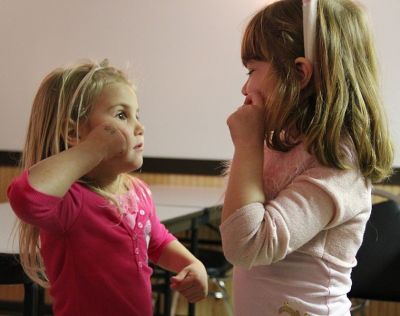Supporting language learning in deaf children

Girls learning sign language, fot. By David Fulmer from Pittsburgh [CC BY 2.0
EU-funded research explored the linguistic and non-linguistic cognitive processes in deaf children's development of spoken and signed language vocabulary. This pioneering initiative studied their language learning profiles using dynamic language assessment.
The SIGNLEARNSPEAK project was the first-ever study using this approach
with a signing deaf population. The team employed a test-teach-retest
design whereby deaf children completed vocabulary tasks in American Sign
Language (ASL) and English. The subjects participated in one-on-one
interactions, mediated learning experiences (MLEs), with a hearing adult
fluent in both ASL and English.
Vocabulary tasks were adapted from British Sign Language, and activities developed for the MLEs targeted vocabulary knowledge in ASL as well as English. For ASL, activities included sorting by size, colour and shape, and/or matching pictures/ASL signs based on category (e.g. apple = fruit).
In the project's second year, the team tested 37 deaf children who were randomly assigned to a mediation or non-mediation group. Eighty-nine age-matched hearing children comprised a control group completing the English vocabulary tasks and two ASL tasks.
Initial results showed that the ASL vocabulary tasks were age sensitive and correlated with each other. Regarding the dynamic assessment procedures, mediation group subjects showed important gains in their post-test vocabulary performance. No significant differences were observed in the no-mediation control group. Both strong and weak language users benefited from mediation, with end-of-session ratings showing cognitive strategies to be the strongest predictors of language ability.
Activities in the final project year focused on disseminating findings and advancing training in writing/publishing, leadership and public engagement. Project work and outcomes were shared through publications in peer-reviewed journals, book chapters, presentations at conferences and for non-academic audiences, and community events.
Future plans include examining deaf children's performance on English vocabulary tasks and MLEs targeting knowledge of English vocabulary. SIGNLEARNSPEAK also intends to compare deaf children's performance on the ASL tasks with hearing children's performance on English vocabulary tasks.
Following this, the tasks/MLEs will be administered to a larger sample of deaf children with hearing parents. The tasks will be made available to schools once they have been standardised on a larger sample. This will help teachers decide which area of students' vocabulary needs better support.
published: 2015-05-29